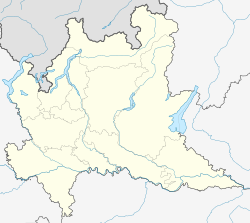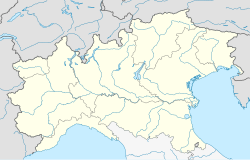 | |||||||||||
| General information | |||||||||||
| Location | Corso Lodi at Viale Brenta, Milan | ||||||||||
| Coordinates | 45°26′33″N9°13′08″E / 45.44250°N 9.21889°E | ||||||||||
| Owned by | Azienda Trasporti Milanesi | ||||||||||
| Platforms | 1 | ||||||||||
| Tracks | 2 | ||||||||||
| Construction | |||||||||||
| Structure type | Underground | ||||||||||
| Accessible | yes | ||||||||||
| Other information | |||||||||||
| Fare zone | STIBM: Mi1 [1] | ||||||||||
| History | |||||||||||
| Opened | 12 May 1991 | ||||||||||
| Services | |||||||||||
| |||||||||||
| |||||||||||
Brenta is a station on Line 3 of the Milan Metro in Milan, Italy. The station was opened on 12 May 1991, as part of the extension of the line from Porta Romana to San Donato. [2]
The station is located on Corso Lodi at the intersection with Viale Brenta, which is in the municipality of Milan. This is an underground station with two tracks in two different tunnels.



